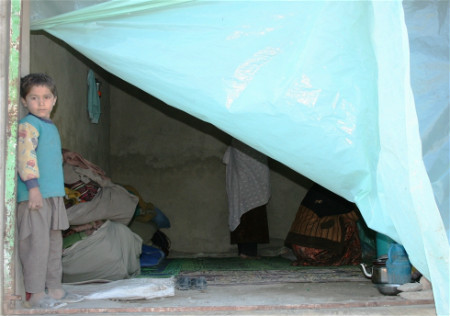TOLOnews.com, December 19, 2015
1.2 million Afghans Displaced This Year: AIHRC
"2015 statistics show that a total 1,257,552 people were displaced which shows a five percent increase compared to 2009"
By Samim
Afghanistan's Independent Human Rights Commission (AIHRC) said on Saturday that a staggering 1.2 million Afghans were displaced this year alone - noting that a volatile security situation in the country was the main reason for the crisis.
AIHRC says that most of those displaced are now subjected to poor living conditions.
Despite the Ministry of Refugees and Repatriations' claim that it has provided basic facilities to internally displaced families, the AIHRC argues that the aid has not been enough.
"2015 statistics show that a total 1,257,552 people were displaced which shows a five percent increase compared to 2009," AIHRC chairperson Sima Samar said.

Winter makes life all the more miserable for the displaced. (Photo: Akmal Dawi/IRIN)
According to Samar, a 21 percent increase has also been recorded in the number of migrants displaced due to the war.
"During June and July 2015, active war was ongoing in 21 provinces out of 34 provinces. The number of internally displaced families also increased with the surge in violence and war," Samar said.
In addition, some Afghan legislators said Saturday that government's lack of attention to the security situation has increased the number of internally displaced people.
"The prevailing situation in the country and the war in various provinces has forced people to migrate from one province to another and even to leave Afghanistan and seek refuge in foreign countries. I think government must change the current situation to control the influx of refugees abroad," MP Fatima Aziz said.
While AIHRC claims that the majority of displaced families are subjected to a miserable life, the Ministry of Refugees and Repatriations maintain sufficient aid has been dispatched to them.
"The Ministry of Refugees and Repatriations in cooperation with the National Disaster Management Authority, the UNHCR and some charity organizations are working together to facilitate the refugees during the winter by providing them with food, fuel and warm clothes. Food is also being provided by the World Food Program," a spokesman for the ministry of refugees and repatriations Islamuddin Juraat said.
Thousands of families were however recently displaced in Kunduz, Helmand and some other volatile provinces following a surge in violence in their areas.
Meanwhile, in a separate study the AIHRC voiced concern over the plight of return refugees. According to Samar the government has not paid enough attention to the returnees.
She said most returnees do not have proper shelter or access to employment.
According to her, residential settlements that are allocated to returnees should be equipped with facilities and become available for their use.
She also called on government to pay attention to the borders and said immigrants deported from Iran and Pakistan face multiple problems.
She said: "The direct supervision of the AIHRC in Islam Qala border in Herat and Zaranj border [with Iran] in Nimroz province show that deportees' human rights have been violated on several occasions by the Iranian security officials during the evictions."
She went on to say that the AIHRC found that last year, 216,923 people were forcibly deported from Iran.
In addition, the deportation of unaccompanied children was one of the major concerns for the AIHRC. The organization also said that more than 90% of those surveyed said they had been forcefully evicted from Iran. "More than 90 percent of those who were taken to the detention center said that the detention center lacked the necessary facilities and they had been in a very bad condition."
"Overcrowded, dirty rooms, mistreatment by detention center staff, darkness and lack of water and bread were the cases pointed out by the interviewees," read the AIHRC's report.
In addition the report stated: "About 30 percent of interviewees said that they or their families were punished in the detention center. Beatings, forced labor, abuse and insults are the major issues that have been mentioned by them."
The report went on to say that the majority of assistance to returnees has been short-term help.
Studies have found that between 2002 and 2014 about 5.8 million Afghan refugees have returned home. The AIHRC said that until 2008, return of refugees was high but since then there has been a significant decrease in numbers.
Characters Count: 5260
